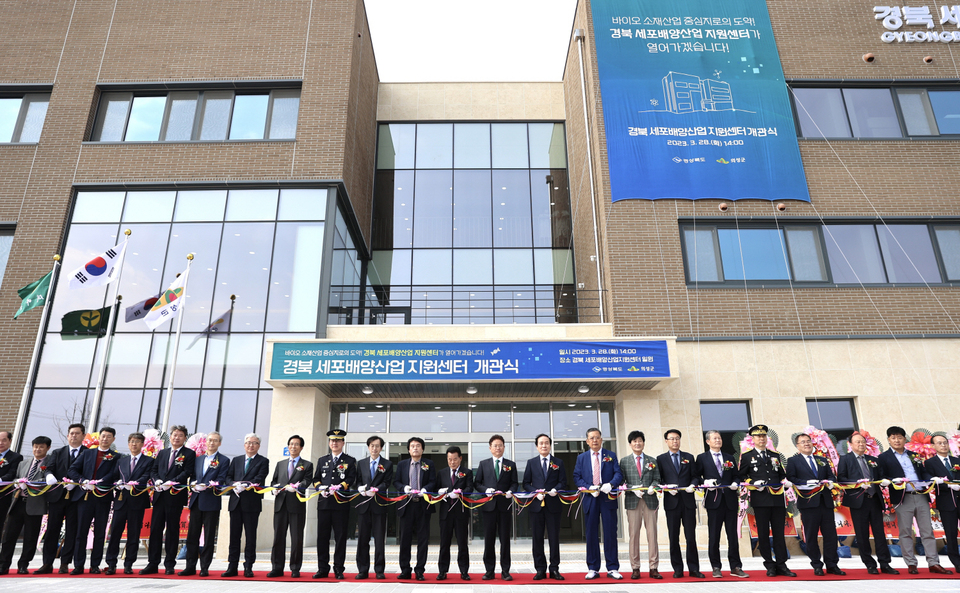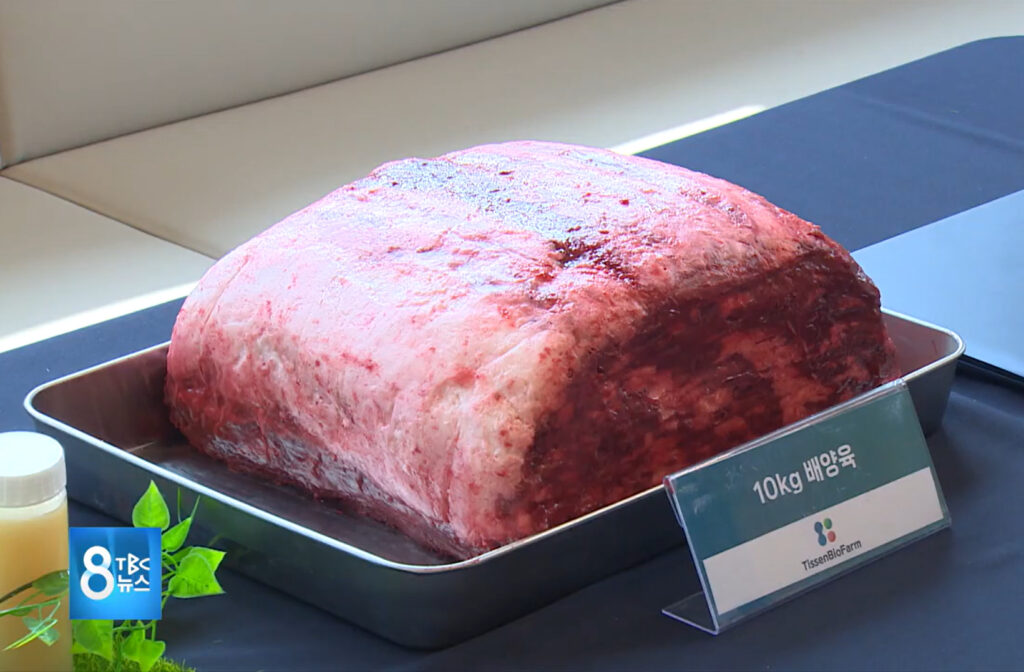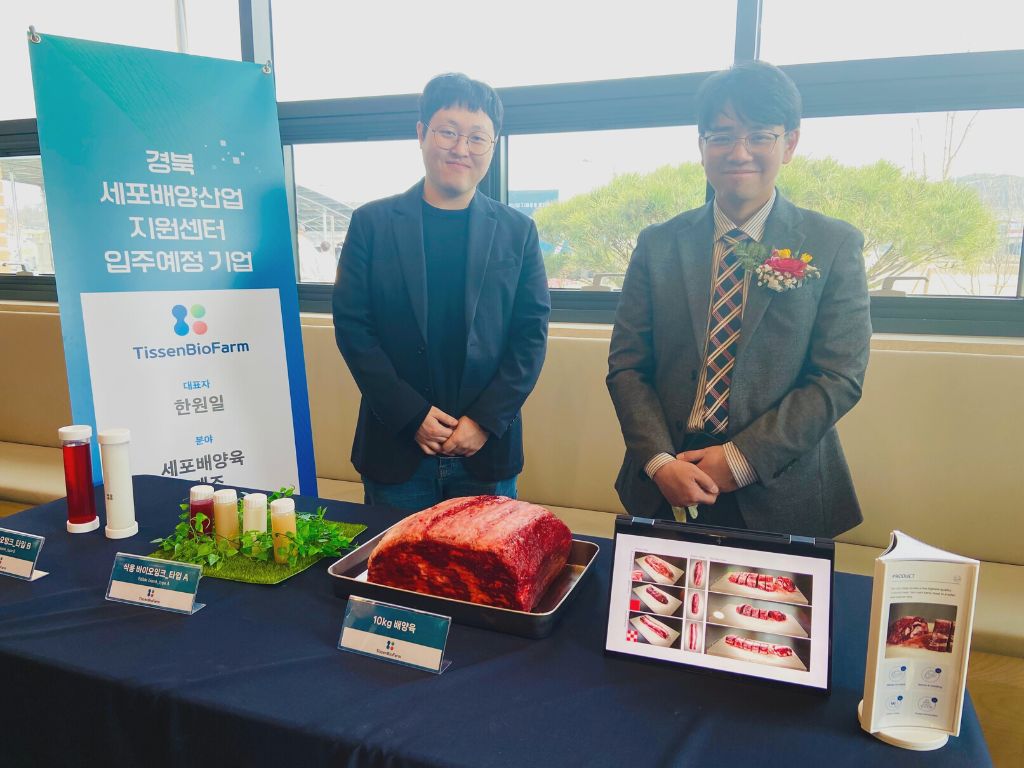South Korea’s Cellular Agriculture Support Center Opens With a Bang: The World’s Largest Piece of Cultivated Meat
4 Mins Read
TissenBioFarm debuted a giant piece of cultivated meat at the opening of South Korea’s Cellular Agriculture Support Center in the North Gyeongsang Province.
This story has been updated at 13.00 on 31 March 2023 with additional information about the company’s 10kg cultivated meat prototype.
South Korea’s North Gyeongsang Province has announced the opening of the North Gyeongsang Cellular Agriculture Industry Support Center. This 2,309㎡ facility was built over six years with a total investment of KRW 9 billion (approx. USD$7 million), and it aims to develop biomaterials and support companies in the cultivated meat sector.
South Korean startup TiessenBio Farm, which raised more than $1.6 million in a Pre-Series A funding round last September, unveiled a 10-kilogram piece of cultivated meat on the occasion.
The North Gyeongsang Cellular Agriculture Industry Support Center
The four-story building houses laboratories, analysis rooms, and quality control rooms. The second floor will host five companies and Yeungnam University Cell Culture Research Center, while the third floor will feature research and analysis rooms with 55 types of corporate equipment to be installed by 2024 with a budget of KRW 3 billion.

“The Cellular Agriculture Industry Support Center opened in Uiseong, where a new airport will be built, is expected to play a pivotal role in advancing a high-tech industry,” Cheol-Woo Lee, Governor of North Gyeongsang Province, said at the launch. “We will continue our support and investment in promising new industries.”
The opening ceremony was attended by about 200 people, including government officials, university representatives, research institutes, and private companies. The site tour showcased five companies, including TissenBioFarm, which unveiled a 10kg cultured meat prototype to the public for the first time. The company claims it is the world’s largest piece of cultivated meat to date.
Green Queen contacted the company for further information to clarify the percentage of cultivated cells and tissue, scaffolds used and what other ingredients the piece contains. We also asked the company to specify what type of animal meat this is. So far, the company has not replied.
Update: Tiessen’s Chief Strategy Officer La Yeonjoo told Green Queen the following via email: “This prototype is a hybrid cultivated meat, consisting of cells and bioink. We have developed original technologies that can make cultured meat of this size while keeping nearly all the cells alive.”
The prototype’s ingredients are as follows: animal cells, bioink, food coloring, palm oil and food adhesive.
La says the company has not yet publicly disclosed the % of cells of this prototype publicly because “it doesn’t appropriately represent the company’s capabilities”, adding that the event organizers at Cellular Agriculture Support Center asked them to make a prototype on very short notice. TiessenBio made it in their small lab in just a few weeks and La said they didn’t have enough time to grow the cells “as much as we wanted to and could have.”
“By the end of this year, we will scale up our cell culture infrastructure, and will showcase 100% cultivated meat (that would translate into approx. 80% cells + 20% bioink and other biomaterials),” she added.
North Gyeongsang Province has also announced its Cellular Agriculture Industry Promotion Strategy, which plans to link with the vaccine, drug, cosmetics, and green bio industries. Uiseong-gun is creating the Uiseong Bio Valley General Industrial Complex for the integration of the cellular agriculture industry.
South Korea’s cultivated meat sector
The opening of the North Gyeongsang Cellular Agriculture Industry Support Center marks a milestone in South Korea’s efforts to develop the cellular agriculture industry. With this center, the country hopes to become a leader in this emerging field.
The center launch comes after 28 key industry stakeholders in South Korea signed a memo of understanding in February to advance the country’s cultivated meat industry.

The North Gyeongsang Province led the MOU. Other signatories include city governments (Pohang-si, Gyeongsan-si, Gumi-si, Uiseong-gun), universities (POSTECH, Yeungnam University), research and technology institutions (Korea Food Research Institute, Gyeongbuk Technopark, Pohang Technopark), and corporations including cultivated meat startup TissenBioFarm, health food manufacturer Ildong Foodis, and functional food ingredients developer Neo-Cremar.
“We are working on groundbreaking technologies to overcome key challenges in the cultivated meat field,” TissenBioFarm CEO Wonil Han said in a statement at the time. “Once it is done, South Korea will be a global game changer in the field.”



